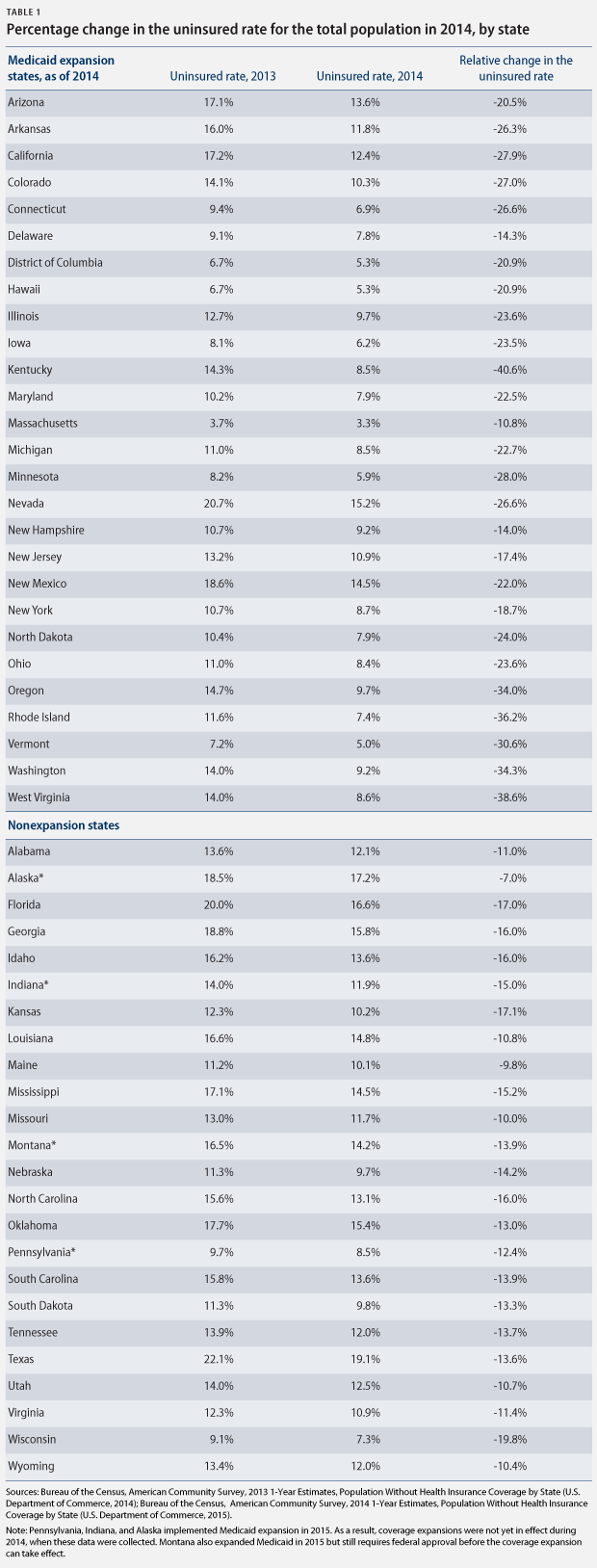New census data released today on poverty and health care measures for 2014 provide indisputable proof that the Affordable Care Act, or ACA, is working to improve access to health care across the country.
Since these new data only cover 2014, they do not include the full second open enrollment period of the ACA’s marketplaces and thus understate the full impact of the ACA. As evident from the recently released National Health Interview Survey, however, the national uninsured rate had dropped by about one-third to a historic low of 9.2 percent as of early 2015, with 15.8 million people gaining coverage since the ACA’s marketplaces opened in late 2013.
Yet while today’s data are not fully up to date, they do provide a comprehensive state-level look at the impact of the ACA and officially confirm, for the first time, that the uninsured rate has dropped in all 50 states and the District of Columbia.

Medicaid expansion would improve coverage gains even further
As the above table confirms, in 2014, the uninsured rate dropped in every state. However, these gains were generally more significant in states that expanded Medicaid coverage under the ACA. Currently, 30 states and the District of Columbia have expanded coverage. Today’s data highlight the stark disparity between states that have expanded Medicaid coverage and those that have not:
- States that expanded Medicaid before 2015 saw their uninsured rates drop by an average of 3.1 percentage points in 2014, for a relative reduction of 25 percent from 2013.
- Nonexpansion states saw their uninsured rates drop by an average of 2 percentage points in 2014, for a relative reduction of 13.4 percent from 2013.
Comparing the average change for expansion states to the changes of the two largest nonexpansion states—Texas and Florida—illuminates the huge ramifications of these states’ refusals to accept federal funds to expand Medicaid coverage:
- Texas reduced its uninsured population by 13.6 percent, with an estimated 701,000 Texans gaining coverage in 2014. If Texas had expanded Medicaid and seen gains similar to those in other states, its uninsured rate could have dropped by an additional 11.4 percent last year.
- Florida reduced its uninsured population by 17 percent, with an estimated 608,000 Floridians gaining coverage in 2014. If Florida had expanded Medicaid and seen gains similar to those in other states, its uninsured rate could have dropped by an additional 8 percent last year.
Thus far, four states that did not expand Medicaid in 2014—Pennsylvania, Indiana, Alaska, and Montana—have done so in 2015, though Montana’s expansion still requires federal approval before it can take effect. Recently, Utah has taken significant steps toward expansion as well. But in the 20 states that have yet to expand Medicaid, almost 4 million uninsured people are trapped in the so-called coverage gap and are unable to find coverage without Medicaid expansion.
The results are clear: The Affordable Care Act is working, even in states that have not yet expanded Medicaid. Today’s data show that if the remaining 20 states took this step, millions more would benefit.
Thomas Huelskoetter is a Research Assistant for Health Policy at the Center for American Progress.